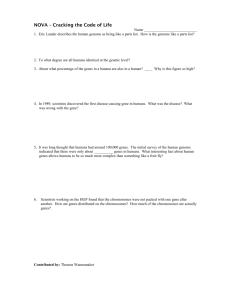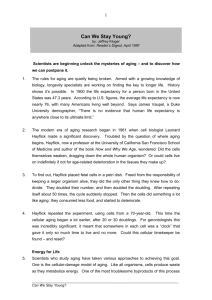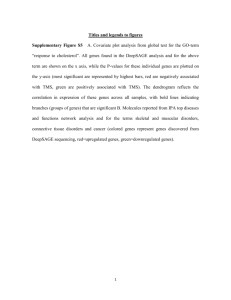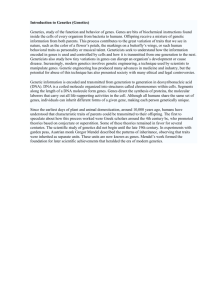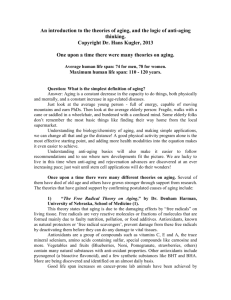Aging and Genetics - Indiana University
advertisement
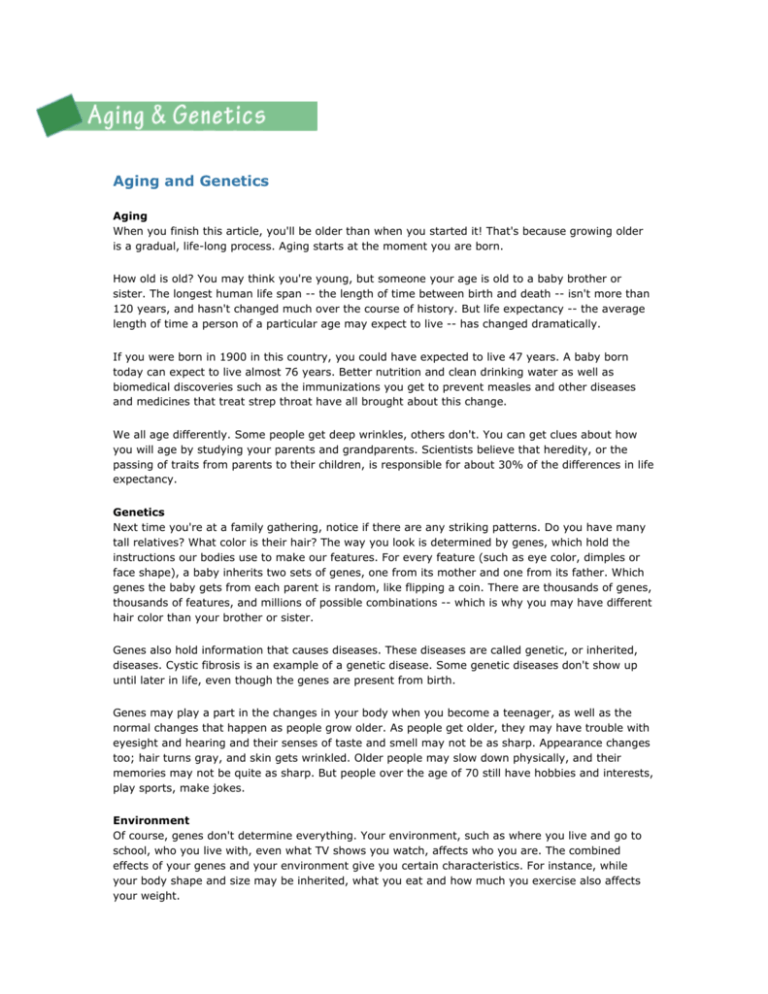
Aging and Genetics Aging When you finish this article, you'll be older than when you started it! That's because growing older is a gradual, life-long process. Aging starts at the moment you are born. How old is old? You may think you're young, but someone your age is old to a baby brother or sister. The longest human life span -- the length of time between birth and death -- isn't more than 120 years, and hasn't changed much over the course of history. But life expectancy -- the average length of time a person of a particular age may expect to live -- has changed dramatically. If you were born in 1900 in this country, you could have expected to live 47 years. A baby born today can expect to live almost 76 years. Better nutrition and clean drinking water as well as biomedical discoveries such as the immunizations you get to prevent measles and other diseases and medicines that treat strep throat have all brought about this change. We all age differently. Some people get deep wrinkles, others don't. You can get clues about how you will age by studying your parents and grandparents. Scientists believe that heredity, or the passing of traits from parents to their children, is responsible for about 30% of the differences in life expectancy. Genetics Next time you're at a family gathering, notice if there are any striking patterns. Do you have many tall relatives? What color is their hair? The way you look is determined by genes, which hold the instructions our bodies use to make our features. For every feature (such as eye color, dimples or face shape), a baby inherits two sets of genes, one from its mother and one from its father. Which genes the baby gets from each parent is random, like flipping a coin. There are thousands of genes, thousands of features, and millions of possible combinations -- which is why you may have different hair color than your brother or sister. Genes also hold information that causes diseases. These diseases are called genetic, or inherited, diseases. Cystic fibrosis is an example of a genetic disease. Some genetic diseases don't show up until later in life, even though the genes are present from birth. Genes may play a part in the changes in your body when you become a teenager, as well as the normal changes that happen as people grow older. As people get older, they may have trouble with eyesight and hearing and their senses of taste and smell may not be as sharp. Appearance changes too; hair turns gray, and skin gets wrinkled. Older people may slow down physically, and their memories may not be quite as sharp. But people over the age of 70 still have hobbies and interests, play sports, make jokes. Environment Of course, genes don't determine everything. Your environment, such as where you live and go to school, who you live with, even what TV shows you watch, affects who you are. The combined effects of your genes and your environment give you certain characteristics. For instance, while your body shape and size may be inherited, what you eat and how much you exercise also affects your weight. Scientists are doing a lot of exciting research about genetics and aging. Some scientists say over the next few decades we'll add another 3 or 4 years to life expectancy. So go ahead and make your plans -- chances are you're going to live a long time. Why We Age Wear and tear and environmental hazards damage body cells. Humans have systems to heal wounds, fight infections, dispose of toxins, and rebuild DNA. However, damage eventually outdistances repair, and the body breaks down. Women have a 10 year advantage in resisting heart disease because estrogen helps them process cholesterol better. After menopause, however, a woman's risk of heart disease is the same as a man's. Work at Stanford University is showing that overexposure to glucocorticoids (stress hormones) may contribute to chronic illness and may actually kill brain cells. Scientists also believe that free radicals (by-products of cells using oxygen to generate energy) damage cell membranes, which possibly opens the door to pathogens. It is thought that Alzheimer's disease and similar diseases may be caused when free radicals wear down the brain's protective barrier. Aging Life expectancy has increased dramatically through the course of this century. When the 21st century begins, one out of four Americans will be 50 or older. Today, 12% of Americans are over 65, yet they account for 36% of personal health care costs. The annual cost of long term care is $54 billion. The number of people over 75 is increasing. People in this age group are most likely to suffer from chronic diseases of old age--arthritis, diabetes, heart disease, strokes, cancers, Alzheimer's disease. Normal Changes in Aging Our bodies wear out at different rates, but we have certain changes in common. The lens of the eye becomes rigid, leading to shortsightedness. Color vision deteriorates. Hearing loss is frequent. By about age 50, tiny bones in the ear fuse together, making high-pitched sounds tough to hear. Environmental effects (working in a noisy factory), can exacerbate this problem. Our taste and smell may also become less acute. Skin loses its elasticity, causing wrinkles. Changes in pigmentation or damage to tiny veins may appear beneath the skin. Loss of cartilage in the spine can cause people in their 70s and 80s to become shorter. Hair may turn gray or white due to lost pigment and drop out or thin out. Seniors move more slowly due to musculoskeletal changes and less lung capacity (the lungs are more rigid). Older people get short of breath because they can't take in as much air. Metabolism slows. Especially when combined with a less active lifestyle, fewer calories and less protein are required. Slowing the Process of Aging Diet: Since the 1930s, studies of mice, rats and other animals have shown that those who ate less than they would eat freely lived up to 50 percent longer. The National Institute of Aging is now feeding primates a diet 30 percent lower in calories. Because these animals can live 40 years, results won't be known soon. Genetics: To reduce damage by free radicals, researchers inserted extra copies of genes for antioxidant enzymes into fruit flies. The extra genes enabled the flies to produce more enzymes, reducing oxidative damage and increasing their life span by 30 percent. Other scientists bred fruit flies for longevity, and doubled the average life. Still others mutated a gene in roundworms and nearly doubled the worms' life spans. Hormones: The adrenal hormone DHEA (dehydroepiandrosterone), when used in mice, seems to reverse the gradual deterioration of the immune system. Clinical trials of DHEA in elderly people are underway. Injections of human growth hormone (HGH) reversed some symptoms of aging in elderly men, but treatments are expensive and usually have side effects. Better medical treatment: Research on heart disease, hypertension and cancer will not only increase life expectancy, but improve the quality of life. Variations in Life Expectancy According to the World Health Organization (WHO), the poorest countries have almost half the life expectancy of the richest. However, worldwide, life expectancy has increased over the last 25 years due to: Disease prevention through lifestyle changes and better hygiene (safer water supplies, food regulation, better handling of sewage); Eradication or cure of diseases that strike young people; and treatments for heart disease and cancer in the developed world. Meanwhile, billions of people suffer from disease and preventable illness because of poverty and lack of access to health services. More than half of the world's people cannot get the most essential drugs, immunizations for children, and medicines for chronic diseases, such as insulin for diabetes. These problems are exacerbated by malnutrition, which strikes about one third of the world's children.

